Thirty years ago, the Chinese army opened fire on student-led, pro-democracy demonstrators near Tiananmen Square in Beijing.
Hundreds - possibly thousands - of people died on the night of 3-4 June 1989.
The Beijing government denounced the protests as counter-revolutionary riots and sent the ringleaders, who had not managed to escape in time, to prison.
In the crackdown that followed, eyewitnesses who dared to contradict the official narrative were punished, some with life imprisonment.
Investigations followed and many workers who were discovered to have supported the protests - which had begun in April and were as much about anti-corruption as democracy - were demoted. Their children sometimes faced barriers to education and employment as a result.
For others who had been in Tiananmen Square but were not caught, silence was the only option.
And most have kept silent ever since.
In a whispered exchange, one eyewitness gave these photographs and a personal account of events to reporter Yvonne Murray.
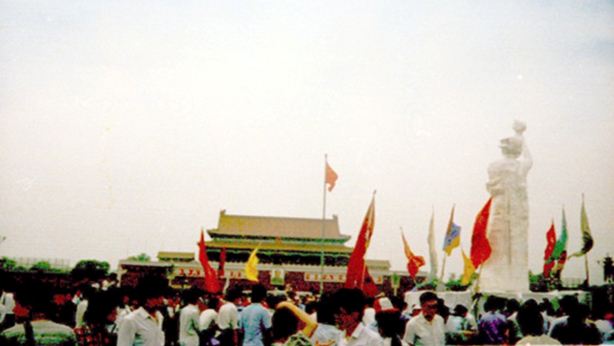
"Whatever you do, don’t tell anyone where you got them.
"A friend of mine developed the pictures for me in secret and I’ve kept these hidden for 30 years."
"I haven’t shown them to anyone.
"For people like me, a camera in those days was a very expensive possession. I was terrified that the police would see me taking photos and confiscate my camera.
"I only managed to snap a few photos. Now, of course, I really regret not taking more.
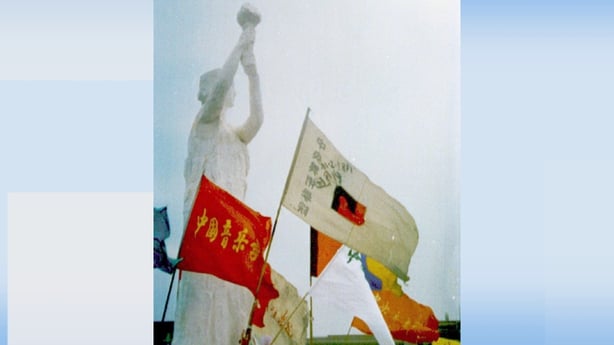
"In this photo, we can see flags from the universities and work units. One day some art students brought this huge model made out of simple materials and put it up in the square. It was called the Goddess of Freedom.
"In the days running up to 4 June - it was a mess at the square. The air really stank of rubbish because nothing had been cleared away. Conditions were pretty unsanitary.
"But the atmosphere was buoyant - we felt so free to speak our minds at that time. There were students and teachers and intellectuals giving speeches on loudhailers to the crowds. We’d go down after work to listen and express our support.
"There were crowds of at least 20,000-30,000 in the square every day but it felt orderly and calm."
"I remember seeing students who had been on hunger strike being carried away on stretchers. They’d fainted from the hunger. People had been sending them bread and milk and eggs but they wouldn’t eat.
"Lots of people were helping the students and some were passing hats around to collect donations. People gave 5 or 10 yuan. If you think about it, that was a lot of money for people earning about 100 yuan a month. But most people were really happy to give.
"We’d go home in the evening and watch the TV to keep track of events. I remember watching Zhao Ziyang [General Secretary of the Communist Party] go down to the square on a rainy night to try and persuade the students to leave. Of course, now we know that he’d already lost the battle inside the Politburo against the hardliners.
"I also remember watching the student hunger strikers who went to meet the Premier Li Peng in the Great Hall of the People. Some of them had come straight from hospital and were still wearing their hospital pajamas. But I remember being so impressed with how these young people - only around 20 or 21 years of age - could express their ideas so articulately and passionately.
"There was such a sense of hope in the air. We believed change was coming.
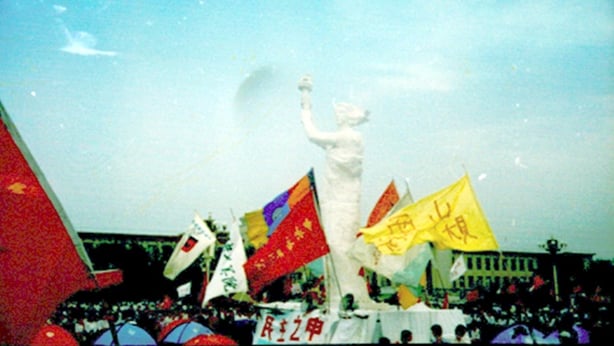
"On the evening of 3 June, I went home - maybe around 9-10pm. I still didn’t expect what happened next. No one ever thought the army would shoot the students.
"In the middle of the night, I was woken up by the sound of gunshots.
"It sounded just like Chinese New Year firecrackers going off around the city. We could hear the shooting for the next few hours - sometimes intense gunfire, other times more sporadic."
"We just couldn’t believe that they had opened fire. The next morning, we went out of our apartment block and spoke to the neighbours. Everyone was in shock.
"'Don’t go to Tiananmen,' people were warning.
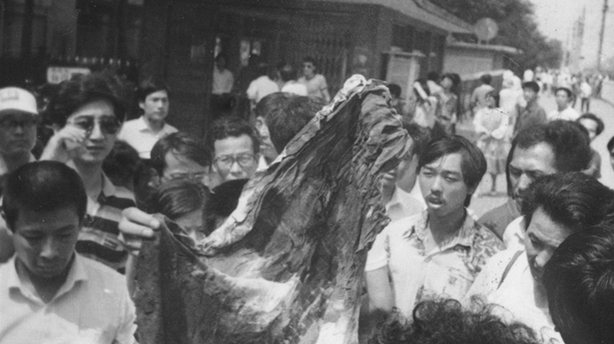
"I took this photo on 5 June. By then, I had run out of colour film - it was really difficult to get hold of colour film in China in those days. I had to switch to black and white.
"When I took this shot of this piece of clothing drenched in blood, it was like photographing a scene from a film, or a TV drama. It felt surreal.
"We were really in a state of shock.
"We kept asking: 'Why did they have to shoot them? Why?'
"We burned with anger towards the government.
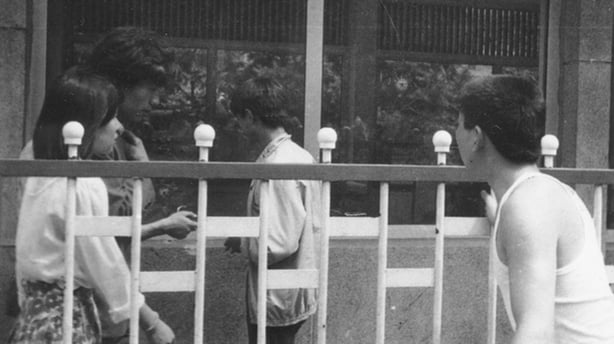
"We thought they’d use rubber bullets or tear gas maybe. But they used real bullets.
"We could clearly see bullet holes in the buildings and windows (above) near the square afterwards.
"In the few weeks afterwards, they disappeared. I suppose they were just quietly repaired as part of the process to erase evidence of what happened.
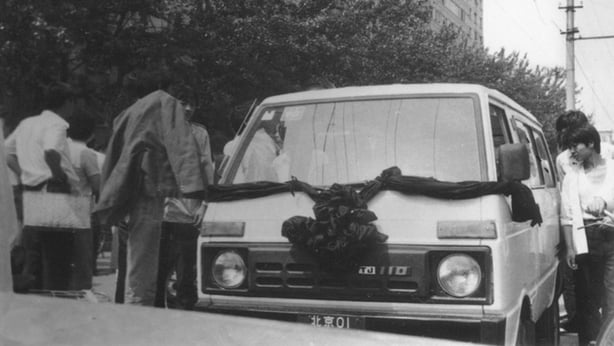
"This is a van taking some of the dead away to the crematorium. I remember seeing wounded people outside the hospital near my house and dead bodies lying in the hospital grounds.
"No one knows how many people died that night. I think it was probably around 2,000."
"I believe some soldiers shot their guns into the sky or onto the ground. If they hadn’t, the death toll would have been a lot higher.
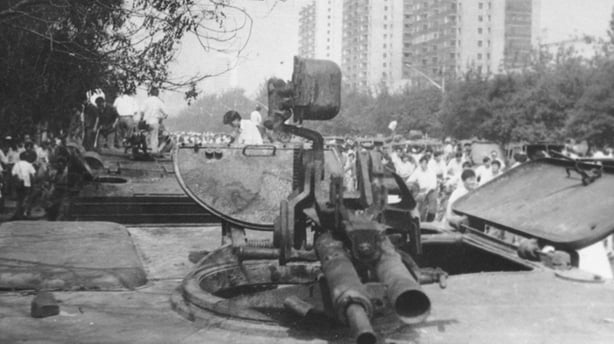
"These were abandoned tanks. The soldiers inside them had fled.
"Many soldiers died too on 4 June. We felt sorry for them. After all, they were following orders from the top.
"I remember being really nervous of plain-clothes policemen when I was taking these photos in the aftermath."
"I would look around - it could have been any face in the crowd because they were dressed the same way as the rest of us. I would have been in trouble if I’d been caught.
"And these days with all the surveillance cameras in Beijing, there’s no way I could get away with it.
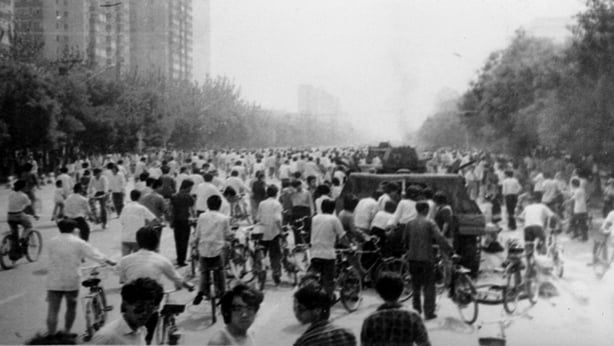
"Lots of people were cursing the government. It was such a barbarous thing to do.
"Three days afterwards they declared it a 'counter-revolutionary rebellion'. Although we were all so angry in our hearts, we could never speak of it again. That was it. We had to fall into silence and go back to our old lives."
"In those days, everyone had a police file and employers could ask to see it. So, if you went for a new job and your file was stamped with a record showing that you’d been in Tiananmen, you could forget it. There was no way you’d be given that job.
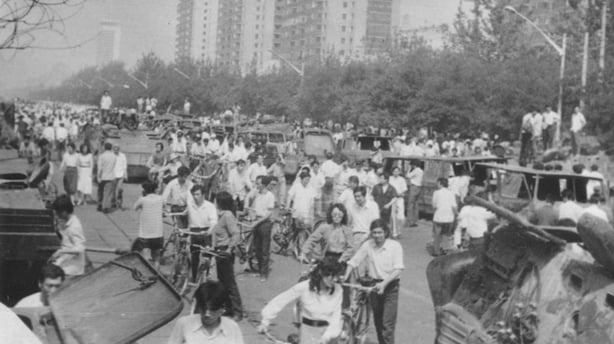
"A few days afterwards, we rode our bicycles down to Tiananmen Square. The square was blocked off with military vehicles and soldiers guarding the entrance. I remember the noise of the helicopters, flying in and out of the square.
"As we approached the west side, I saw three of four soldiers on a roof. They were holding machine guns. Suddenly someone in the crowd shouted: 'they’re shooting again!' and we all ran for our lives. I don’t know to this day if it was real or not, but we were so scared, we just ran away as fast as we could.
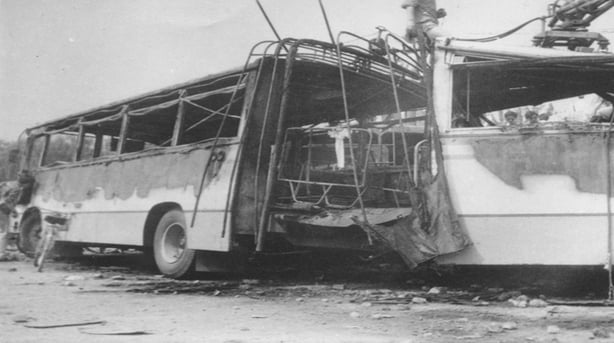
"I don’t know who set fire to the bus. It was completely burnt out and below - there’s a burning tank.
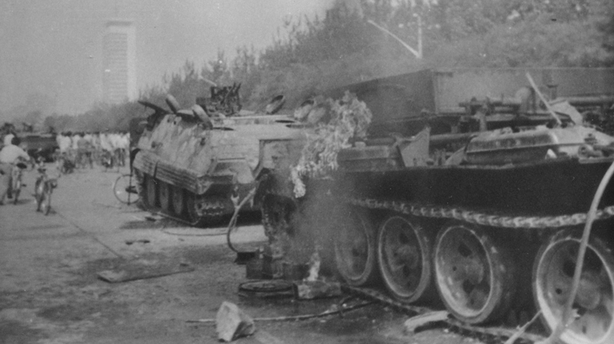
"Our anger gave way to depression.
"Lots of people left to go abroad. We’d lost hope.
"The government will never admit what happened that night. Nor will they change the official narrative. If they tried to change it, so many people would be angry.
"What about the families who lost their children that night? The people the government called anti-patriotic rioters and thugs? They would want justice.
"They said they weren’t patriots. But they were. They loved their country - they were doing it for China.
"So no, they’ll never admit anything. They’d rather we would just all forget.
"Also, the government is very afraid of instability. In China now, you can do anything - you can travel, buy things, do business, study. Everyone has enough to eat.
"But you can’t speak your mind. You can’t demonstrate. You can’t talk about politics. And things are getting stricter all the time.
"As for the younger generation now, most of them don’t know what happened on the 4th June 1989. They don’t know the army opened fire on protesters, because no one talks about it."
"And anyway the pressures are too big for young people in China today. They have to focus on making enough money to buy a house, raise their children and care for their parents. They don’t have time for politics.
"And with this generation of one-child families, no parent these days would let their only child go and protest at Tiananmen Square.
"For me looking back now 30 years on, what can I say?
"I feel an overwhelming sense of disappointment. I see it as a missed opportunity and it won’t ever come again.
"Not in my lifetime anyway."

